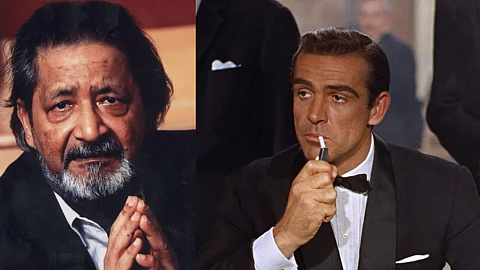
- HOMEGROWN WORLD
- #HGCREATORS
- #HGEXPLORE
- #HGVOICES
- #HGSHOP
- CAREERS
- ABOUT US
- CONTACT US

Few musical phrases are as instantly recognisable or as enduring as the piercing guitar riff that heralds the arrival of our favourite spy, James Bond. Composed by Monty Norman for the first Bond film, 'Dr. No' (1962), the theme has become a global shorthand for suave danger, espionage, and effortless cool. But what’s lesser known is the unusual origin of this now-iconic melody.
In the early 1960s, Norman was working on a musical adaptation of V. S. Naipaul’s acclaimed novel A House for Mr Biswas, which tells the story of a Trinidadian man of Indian descent navigating the complexities of postcolonial identity. Though the musical was never produced, partly due to the logistical challenges of casting South Asian performers for the West End, one of its songs lived on. Titled 'Bad Sign, Good Sign', the piece was composed using sitar and tabla, with lyrics delivered in a playful cadence referencing an “unlucky sneeze.”
When producers approached Norman to score 'Dr. No', he revisited this shelved composition. Stripping the lyrics and adapting the melodic line, he reworked the sitar motif into a twangy, suspenseful guitar riff — one that would eventually become the defining musical signature of the Bond franchise. “I split the notes,” Norman recalled, “and the theme emerged with a whole new feel, yet the structure remained essentially the same.”
The final version of the theme came to life with help from composer and arranger John Barry, who was brought in to enhance the orchestration. Barry added the bold brass and jazz-inspired flourishes, while guitarist Vic Flick contributed the famous guitar tone that gave the theme its unmistakable crunch and now-mythic edge. Though Barry's arrangement has often overshadowed Norman's authorship in the public eye, Norman successfully defended his credit in court multiple times, remaining the legally recognised composer.
The story feels almost poetic. A song written for a diasporic Indian character in a never-produced musical eventually morphed into the sonic identity of a British spy known the world over. Beneath Bond’s polished bravado lies a lineage that runs through the sitar and storytelling traditions of South Asia — an unexpected twist that gives new desi-ness to a melody we thought we knew. And if you listen closely you might even hear it.
If you enjoyed reading this here's more from Homegrown:
Meet The Indian Raga Rock Maestro Who Jammed With Jimi Hendrix & The Doors
Tracing R.D. Burman's Enduring Influence On Homegrown Electronic Music
M.I.A x Bappi Lahiri: 5 Times Pop Music Sampled Retro Bollywood Music
